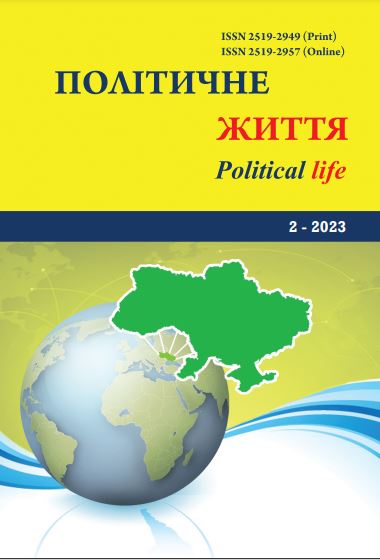Political Space: Methodological Approaches to the Formation and Development of the Concept
DOI:
https://doi.org/10.31558/2519-2949.2023.2.4Keywords:
methodology; political space; political process; decentralization; territorial policy; World Order; glocalization; regions; localitiesAbstract
The article defines the peculiarities of the methodological basis for studying the concept of "political space". The purpose of the study is to establish whether the development of the scientific and methodological conceptualization of political space corresponds to the dynamics of the process of its global deterritorialization. Achieving this goal involved: analyzing the formation and development of the discourse on the space of political action (which can be territorialized and deterritorialized); determining the relevance of deterritorialization of the political process at the present stage; determining whether the dynamics of the scientific and methodological conceptualization of political space corresponds to the actual political processes of its development. The answers to the set tasks determine the logic of the research and its structure.
It is noted that the national-territorial space of political action, traditional for the Modernity (Westphalian logic of the international order), loses its unambiguous territorial dimension and becomes the result of political management. Strategic documents of the EU and Council of Europe institutions, as well as recommendations and resolutions of socio-political structures, based on the UN Agenda 2030 program, announce reforms of decentralization, spatial deconcentration of resources and functions, and dehierarchization of complex systems. The Postmodern era with its ideas of networking and dehierarchy levels the territorial space as a condition for political interaction, and assumes an active role of a mobile subject constructing a new reality. The academic consequence of transformations is a rethinking of the processes of global reformatting and organization of territorial and political processes. The paper defines the periodization of the development of the methodology for analyzing territorial and political systems, clarifies the relationship between the concepts of "place", "territory", "space", which is determined by the chosen methodology of analysis. It is shown that the conceptualization of the concept of "political space" is associated with the definition of the nature of "space" as an objective, subjective or intersubjective reality, as well as with the definition of the basic methodological basis for the study of space as an objective or constructed in the process of "battle of cognitive maps" reality.
References
Дві діаспори: битва за голоси угорських виборців, включно з українським Закарпаттям. Радіо Свобода. 19 лютого 2022, 09:00 URL: https://www.radiosvoboda.org/a/uhorshchyna-vybory-diaspora-orban-ukrayina/31710484.html (дата звернення: 27.05.2023)
Коч С. В. Транскордоння: простір соціального порядку і політичної дії: монографія. Одеса: Фенікс, 2019. 357 с.
Узун Ю. В. Привласнення простору: організація взаємодії в складних політичних системах: монографія / Ю. В. Узун. – Одеса: Фенікс, 2021. – 378 с.
Узун Ю.В. «Ефективне» громадянство в державах ЄC: інструмент територіально-політичної (де)конструкції. Міжнародні та політичні дослідження. 2022. Вип. 35. С.120–145.
Узун Ю.В. Територіальна політика держав ЄС: стабілізація та конструювання політичних систем. автореф. дис. на здобуття наук. ступеня д-ра політ. наук : 23.00.02. Одеса, 2021.40 с.
Deutsch K., Singer D. Multipolar Power System and International Stability. World Politics. 1964. Vol. 16. No. 3. P. 390 – 406.
EU. Territorial Agenda 2030: A future for all Places. Informal meeting of Ministers responsible for spatial planning, territorial development and/or territorial cohesion. 1 December 2020, Germany. URL: https://territorialagenda.eu/wp-content/uploads/TA2030_jun2021_en.pdf (дата звернення 22.06.2021).
Financial and social instrument of uniting community in the World. International roman union
Foucher M. An Original European Geopolitical Complex. Inflexions. 2015. Vol. 30, Is. 3. P. 177 – 186.
Haas E. B. Regime Decay: Conflict Management and International Organizations, 1945–1981. International Organization. 1983. No. 37/2. P. 189 – 256.
Hettne B. Beyond the «New Regionalism». New Political Economy. 2005. No. 10/4. P. 543 – 571.
Hettne B., Söderbaum F. Theorising the Rise of Regionness. New Political Economy. 2000. Vol. 5. P. 57–472.
Horowitz D. A Democratic South Africa?: Constitutional Engineering in a Divided Society. Published by University of California Press. 1991. 295 р.
Kaplan M. A. System and Process in International Politics. UK: ECPR Press, University of Essex in Colchester, 2005. 253 p.
Kelly R. E. Security Theory in the “New Regionalism”. Studies Review. 2007. No. 9/2. P. 197 – 229.
Lacoste Y. Geography, Geopolitics, and Geographical Reasoning. Herodote. 2012. Vol. 146–147. Is. 3–4. P. 14–44.
Liegeois J.-P. Roma, Gypsies, Travellers. Strasbourgh: Council of Europe, 1994. 323 р.
Office of the president of IRU Normonds Rudevics. URL: http://iru2020.org/IRU-bank.pdf (дата звернення 22.04.2023).
Roma Passport. Additional ID document (not valid for travel) URL: http://iru2020.org/#passport (дата звернення 22.04.2023).
Waltz K. Theory of International Politics. Cambridge: Addison-Wesley Pub, 1979. 251 p.

